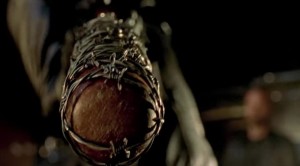 The season 7 premiere episode of The Walking Dead last week which saw the deaths of two main characters by bludgeoning with a baseball bat named Lucille at the hands of Negan has created a firestorm of controversy and discussion among fans and in other pop culture circles. With this post I’ll summarize and respond to some of it.
The season 7 premiere episode of The Walking Dead last week which saw the deaths of two main characters by bludgeoning with a baseball bat named Lucille at the hands of Negan has created a firestorm of controversy and discussion among fans and in other pop culture circles. With this post I’ll summarize and respond to some of it.
The foundation for these reactions was disgust at the graphic violence in the deaths, and the loss of Glenn, a character who was beloved by fans and who had been on the show since the first season. It is natural for fans to mourn the loss of a character they have invested so much in emotionally, and it is also understandable that a depiction of a realistic murder by bludgeoning would be found distasteful. These items are not in question. However, what fans and pop culture commentators did as a result of this was somewhat surprising.
One response was for a number of fans to announce that they are now done with watching the show. An article in USA Today summarized this best with the title “Has ‘The Walking Dead’ finally gone too far for fans?” The concerns that have been expressed in various sources are that the graphic violence was too much, and that it was violence for violence’s sake with no redeeming value to the storyline or culture. Let’s take the first of these concerns, that the violence went too far. Where is the line to be drawn on what is too much (Hershel’s beheading is ok but not Glenn’s head bashing)? Weren’t viewers aware that the television series is based on the graphic novels, and that Negan’s character was known for this kind of violence? Where was the surprise? And why the disconnect between fiction and real-world violence? Fictional violence, even as art, is not totally disconnected from the real-world, and it draws upon real-world violence in order to craft its fictional narrative. And yet many were publicly vocal about the season premier of The Walking Dead who likely haven’t said a word about the carnage and near-genocide taking place in Syria. At the very least Americans have their priorities out of whack.
Let’s address the question of whether The Walking Dead is now just engaging in violence for violence’s sake and that it has no redeeming value. (This point when raised by Christians is of particular interest to me given the graphic violence inherent in the Bible’s pages, not all of which appears redemptive in its immediate context.) I have written several posts in the past that interacted with topics issues raised by the series, including suicide, confidence in humanity, religion, and other social and cultural issues. Some may counter by arguing that this is The Walking Dead of the past and now it’s just all violence. But wait a minute. The second episode of Season 7 introduced King Ezekiel, and this character raises interesting questions about the social construction of reality and living subjectively with stories in the midst of a violent world. Surely this is yet another example of redeeming value that still surfaces in connection with a violent television program.
Then, finally, there’s an interesting thought raised in a piece in Variety. It notes that The Walking Dead is not the only program graphically depicting head bashings, and that there are other programs which have done this too, so much so that Variety characterizes this as a trend. This particular concern is of interest given the broader cultural context in which it takes place. As I’ve stated on Facebook, “I wonder if some of the revulsion is connected to our broader cultural context of the ongoing ‘War on Terror’ anxiety, government sponsored torture, and general terrorist violence as well as beheadings. Art does imitate life, and we may find the reflection distasteful.”
At the end of the day, The Walking Dead is entertainment, and viewers are free to tune in or stop viewing at their pleasure, and for whatever reasons. But I’d like to see them reflect a little more carefully on them.





There are no responses yet